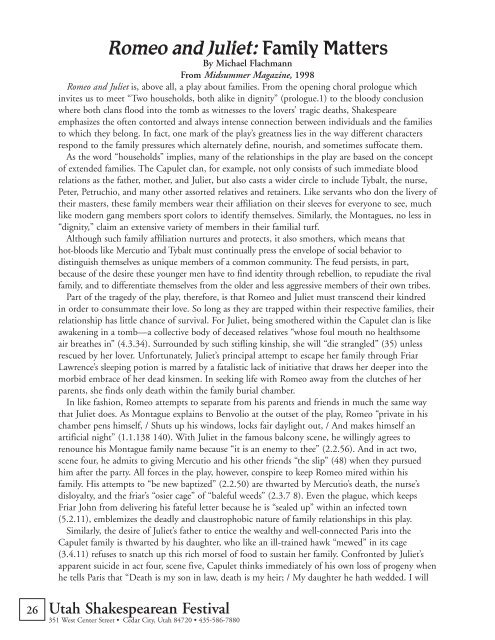Romeo and Juliet - Mr. Robertson's Bunker
Romeo and Juliet - Mr. Robertson's Bunker
Romeo and Juliet - Mr. Robertson's Bunker
You also want an ePaper? Increase the reach of your titles
YUMPU automatically turns print PDFs into web optimized ePapers that Google loves.
<strong>Romeo</strong> <strong>and</strong> <strong>Juliet</strong>: Family MattersBy Michael FlachmannFrom Midsummer Magazine, 1998<strong>Romeo</strong> <strong>and</strong> <strong>Juliet</strong> is, above all, a play about families. From the opening choral prologue whichinvites us to meet “Two households, both alike in dignity” (prologue.1) to the bloody conclusionwhere both clans flood into the tomb as witnesses to the lovers’ tragic deaths, Shakespeareemphasizes the often contorted <strong>and</strong> always intense connection between individuals <strong>and</strong> the familiesto which they belong. In fact, one mark of the play’s greatness lies in the way different charactersrespond to the family pressures which alternately define, nourish, <strong>and</strong> sometimes suffocate them.As the word “households” implies, many of the relationships in the play are based on the conceptof extended families. The Capulet clan, for example, not only consists of such immediate bloodrelations as the father, mother, <strong>and</strong> <strong>Juliet</strong>, but also casts a wider circle to include Tybalt, the nurse,Peter, Petruchio, <strong>and</strong> many other assorted relatives <strong>and</strong> retainers. Like servants who don the livery oftheir masters, these family members wear their affiliation on their sleeves for everyone to see, muchlike modern gang members sport colors to identify themselves. Similarly, the Montagues, no less in“dignity,” claim an extensive variety of members in their familial turf.Although such family affiliation nurtures <strong>and</strong> protects, it also smothers, which means thathot-bloods like Mercutio <strong>and</strong> Tybalt must continually press the envelope of social behavior todistinguish themselves as unique members of a common community. The feud persists, in part,because of the desire these younger men have to find identity through rebellion, to repudiate the rivalfamily, <strong>and</strong> to differentiate themselves from the older <strong>and</strong> less aggressive members of their own tribes.Part of the tragedy of the play, therefore, is that <strong>Romeo</strong> <strong>and</strong> <strong>Juliet</strong> must transcend their kindredin order to consummate their love. So long as they are trapped within their respective families, theirrelationship has little chance of survival. For <strong>Juliet</strong>, being smothered within the Capulet clan is likeawakening in a tomb—a collective body of deceased relatives “whose foul mouth no healthsomeair breathes in” (4.3.34). Surrounded by such stifling kinship, she will “die strangled” (35) unlessrescued by her lover. Unfortunately, <strong>Juliet</strong>’s principal attempt to escape her family through FriarLawrence’s sleeping potion is marred by a fatalistic lack of initiative that draws her deeper into themorbid embrace of her dead kinsmen. In seeking life with <strong>Romeo</strong> away from the clutches of herparents, she finds only death within the family burial chamber.In like fashion, <strong>Romeo</strong> attempts to separate from his parents <strong>and</strong> friends in much the same waythat <strong>Juliet</strong> does. As Montague explains to Benvolio at the outset of the play, <strong>Romeo</strong> “private in hischamber pens himself, / Shuts up his windows, locks fair daylight out, / And makes himself anartificial night” (1.1.138 140). With <strong>Juliet</strong> in the famous balcony scene, he willingly agrees torenounce his Montague family name because “it is an enemy to thee” (2.2.56). And in act two,scene four, he admits to giving Mercutio <strong>and</strong> his other friends “the slip” (48) when they pursuedhim after the party. All forces in the play, however, conspire to keep <strong>Romeo</strong> mired within hisfamily. His attempts to “be new baptized” (2.2.50) are thwarted by Mercutio’s death, the nurse’sdisloyalty, <strong>and</strong> the friar’s “osier cage” of “baleful weeds” (2.3.7 8). Even the plague, which keepsFriar John from delivering his fateful letter because he is “sealed up” within an infected town(5.2.11), emblemizes the deadly <strong>and</strong> claustrophobic nature of family relationships in this play.Similarly, the desire of <strong>Juliet</strong>’s father to entice the wealthy <strong>and</strong> well-connected Paris into theCapulet family is thwarted by his daughter, who like an ill-trained hawk “mewed” in its cage(3.4.11) refuses to snatch up this rich morsel of food to sustain her family. Confronted by <strong>Juliet</strong>’sapparent suicide in act four, scene five, Capulet thinks immediately of his own loss of progeny whenhe tells Paris that “Death is my son in law, death is my heir; / My daughter he hath wedded. I will26Utah Shakespearean Festival351 West Center Street • Cedar City, Utah 84720 • 435-586-7880
















